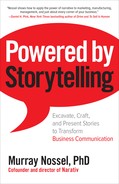NOTES
Introduction
1. Bernard Wood, “Human Evolution: Fifty Years After Homo Habilis,” Nature, April 2, 2014, pp. 31–33.
2. Indeed, it is estimated that 65 percent of our time is spent in narrative. See Leo Widrich, “The Science of Storytelling: Why Telling a Story Is the Most Powerful Way to Activate Our Brains,” December 2012, lifehacker.com.
3. See Mor Regev, Christopher J. Honey, Erez Simony, and Uri Hasson, “Selective and Invariant Neural Responses to Spoken and Written Narratives,” Journal of Neuroscience, vol. 33, no. 40, October 2013, pp. 15978–15988; Jonathan Brennan, Yuval Nir, Uri Hasson, Rafael Malach, David J. Heeger, and Llina Pylkkänen, “Syntactic Structure Building in the Anterior Temporal Lobe During Natural Story Listening,” Brain & Language, vol. 120, 2010, pp. 163–173; and Edward F. Pace-Schott, “Dreaming as a Story-Telling Instinct,” Frontiers in Psychology, April 2013.
Chapter 2
1. An example of one study can be found here: Lucy Clarke-Billings, “Psychologists Warn Constant Email Notifications Are ‘Toxic Source of Stress,’” Telegraph, January 2, 2016, http://www.telegraph.co.uk/news/2016/03/22/psychologists-warn-constant-email-notifications-are-toxic-source/.
Chapter 4
1. Barbara Myerhoff, Number Our Days: A Triumph of Continuity and Culture Among Jewish Old People in an Urban Ghetto, Touchstone/Simon & Schuster, New York, 1980.
Chapter 5
1. Steve Jobs commencement address at Stanford University, 2005, https://www.youtube.com/watch?v=VHWUCX6osgM.
